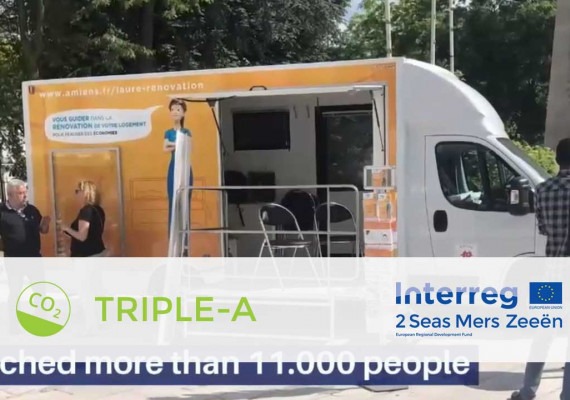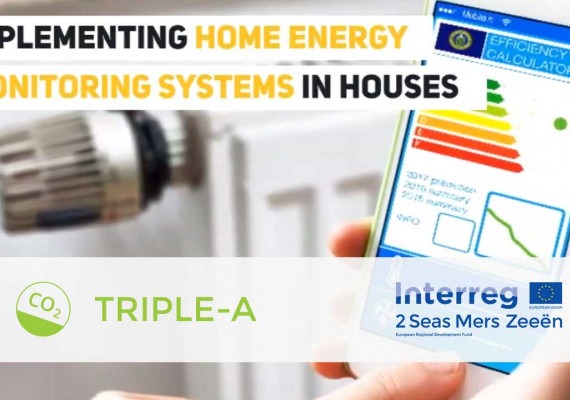Triple-A
Triple-A: stimulating the Adoption of low-carbon technologies by home-owners through increased Awareness and easy Access
Priority Axis
Low Carbon TechnologiesSpecific objective
Low Carbon Technologies
Lead partner
Technische Universiteit DelftContact
Begindatum
01/01/2017Einddatum
30/04/2022Project budget
5 297 095 €ERDF amount
3 178 257 €ERDF rate
60%Over
Common challenge
The building sector accounts for approximately 35% of CO2 emissions in the 2 Seas area. About 50% of the dwellings within this area consists of single-family housing in the owner-occupied sector. Although there is an enormous potential to reduce CO2 emissions by stimulating homeowners to adopt low-carbon technologies, the average renovation rate at the time of project approval was just around 1%.
Triple-A united 7 local authorities pioneering in renovation policies in their ambition to achieve a real market acceleration in this part of the building sector resulting in a significant reduction in CO2 emissions. It addressed two demands: first,latent demand among homeowners for adoption of low-carbon technologies and second, active demand among Local Authorities to implement effective ways to stimulate the market uptake of low-carbon technologies.
The main territorial challenge was to develop an approach that was continuous and comprehensive in terms of technologies and financial facilities promoted to homeowners in a way that it appealed to them and enabled easy access.
Overall objective
Main outputs
Cross border approach
Main Achievements
Seven local authorities(LAs) in the 2 Seas area identified, tested and evaluated new ways of supporting homeowners in local target areas using new communication policy approaches involving web portals, pop-up centres, demonstration exemplars and easy access to home energy monitoring systems (HEMS). An integrated Triple-A strategy was jointly developed with TU Delft, University of Ghent and Eandis/Fluvius. This resulted in a model that helped the local authorities to identify strategic priorities and activities that they could develop to improve supporting single-family homeowners in their quest for renovation measures.
Using this framework, local authorities developed both their virtual and physical consultancy for homeowners. Their web portals were adapted with additional web modules, using both qualitative and quantitative research as well as co-creation with local stakeholders.
The 7 local authorities also launched local pop-up consultancy centres in target areas, either in a fixed location or via a mobile format. Both consultancy developments were supported by literature research, questionnaires, interviews, an inventory of low-carbon technologies and financial schemes, jointly organized business modelling and co-creation workshops and local events. More than 11,500 people visited the popup centres and the pop-up idea was copied by multiple other LAs.
In 8 target areas the 7 local authorities also demonstrated exemplar management using the input from jointly organized workshops, brainstorms, meetings, buddy cooperation, standardised contracts and information about finance, funding and demo models.
Overall, LAs installed 2,542 demo technologies in homes achieving carbon savings of 4,095.7 tonnes per year, and completed 1599 thermographic surveys and 199 feedback surveys.
All partners also investigated the use of HEMS as a means to influence homeowner decisions, and consequently identified promising ways of using, adapting, selecting and procuring HEMS, as well as improved ways to collaborate with local stakeholders. 606 HEMS were installed, about 29% of the responding users also adopted energy saving measures.
Reports and hands-on recommendations for local authorities are available on the Triple-A web site www.triple-a-interreg.eu.
Overall, the Triple-A method was embraced by multiple actors and Triple-A communication activities reached more than 175,000 stakeholders, incl. 4,479 LAs, 6,042 SMEs, 119,499 homeowners.
Testimonial
Partners learned how to structure approaches through the customer journey, identifying needs for coaching homeowners and realizing that a CRM system is an important tool that was underestimated at proposal stage.
The project led to broader view for responding to the needs of energy users and urged LAs to think beyond the engineering part towards services for all people, including a social dimension of energy renovation and approaches towards vulnerable target groups. On the other hand, PPs also realized there is a need to focus more on all citizens of the LA who are planning to renovate - not only those with a limited income - with tailored advice and via pop-ups.
Through the project PPs understood the importance and opportunities of co-creation with various types of stakeholders and realized that the initial scope can increase when working with partners.
Most important were the informal moments for personal exchange of knowledge during meetings.


